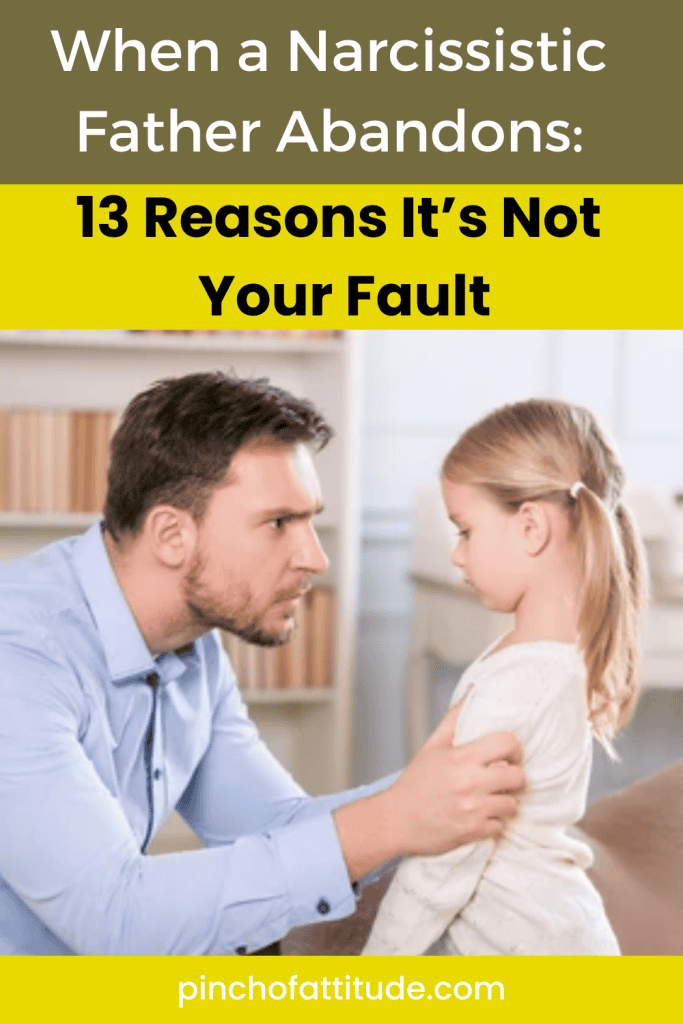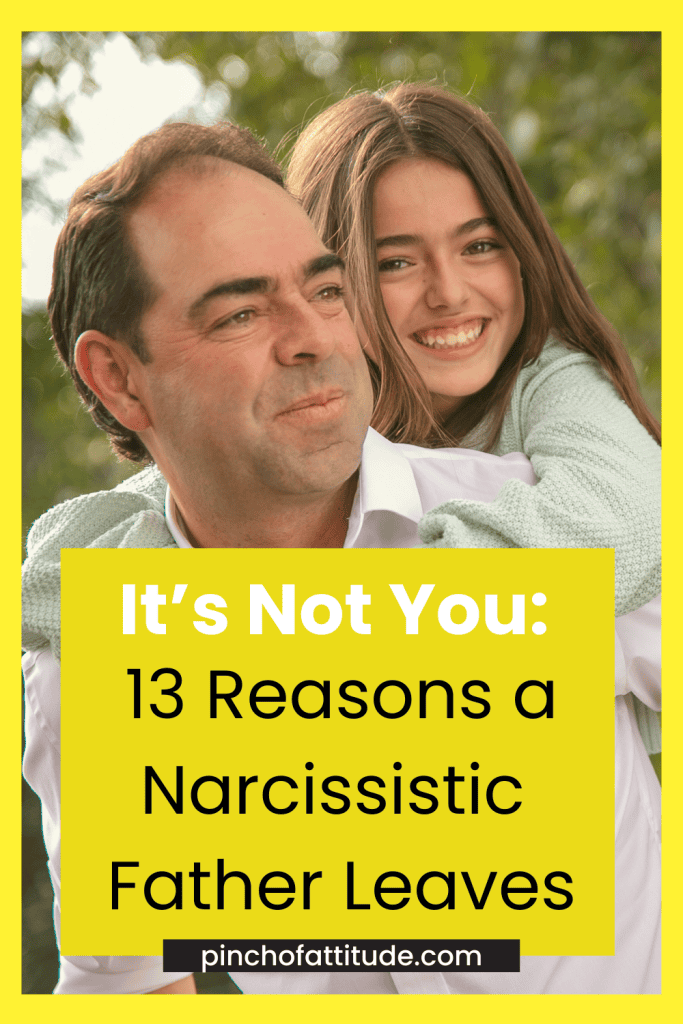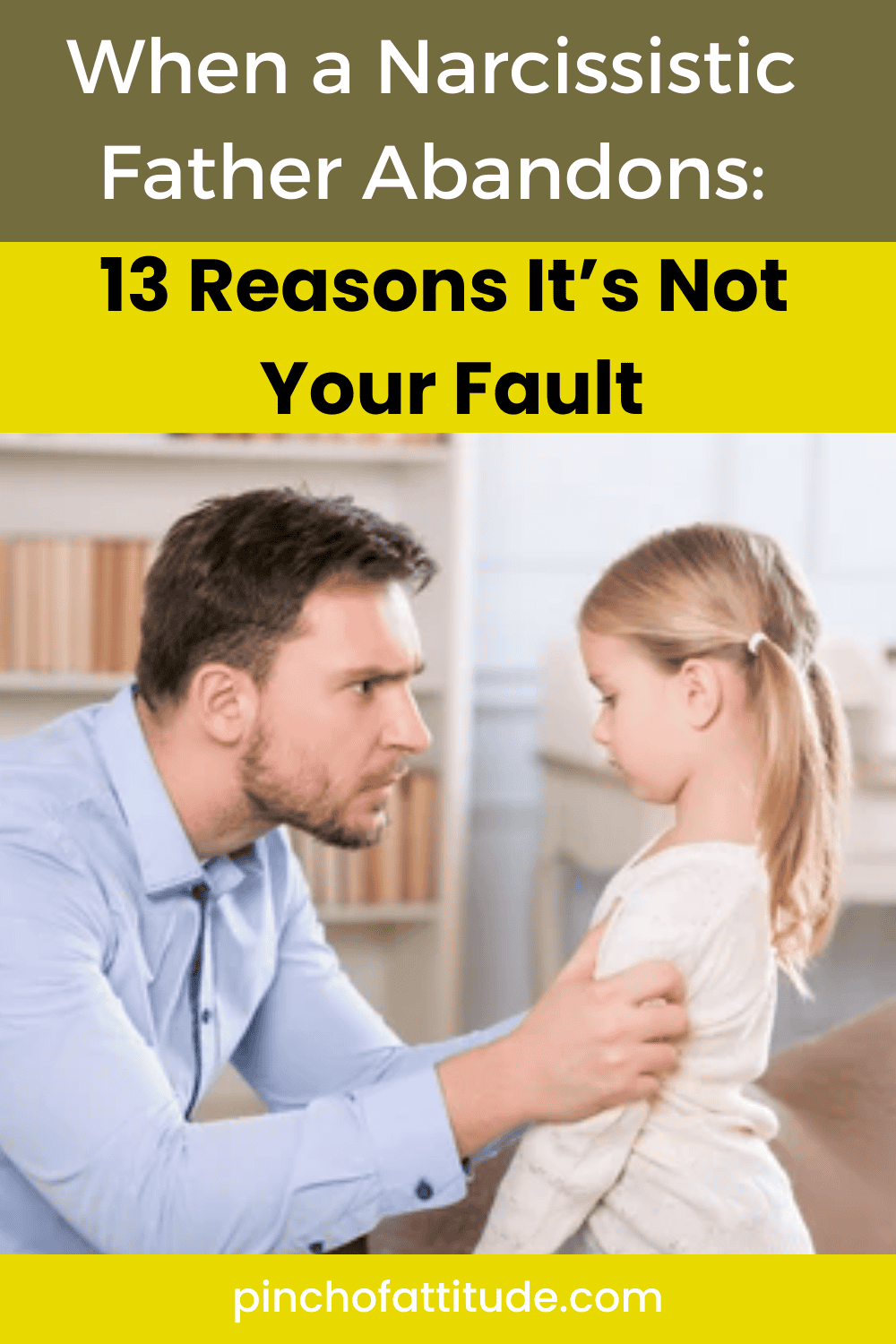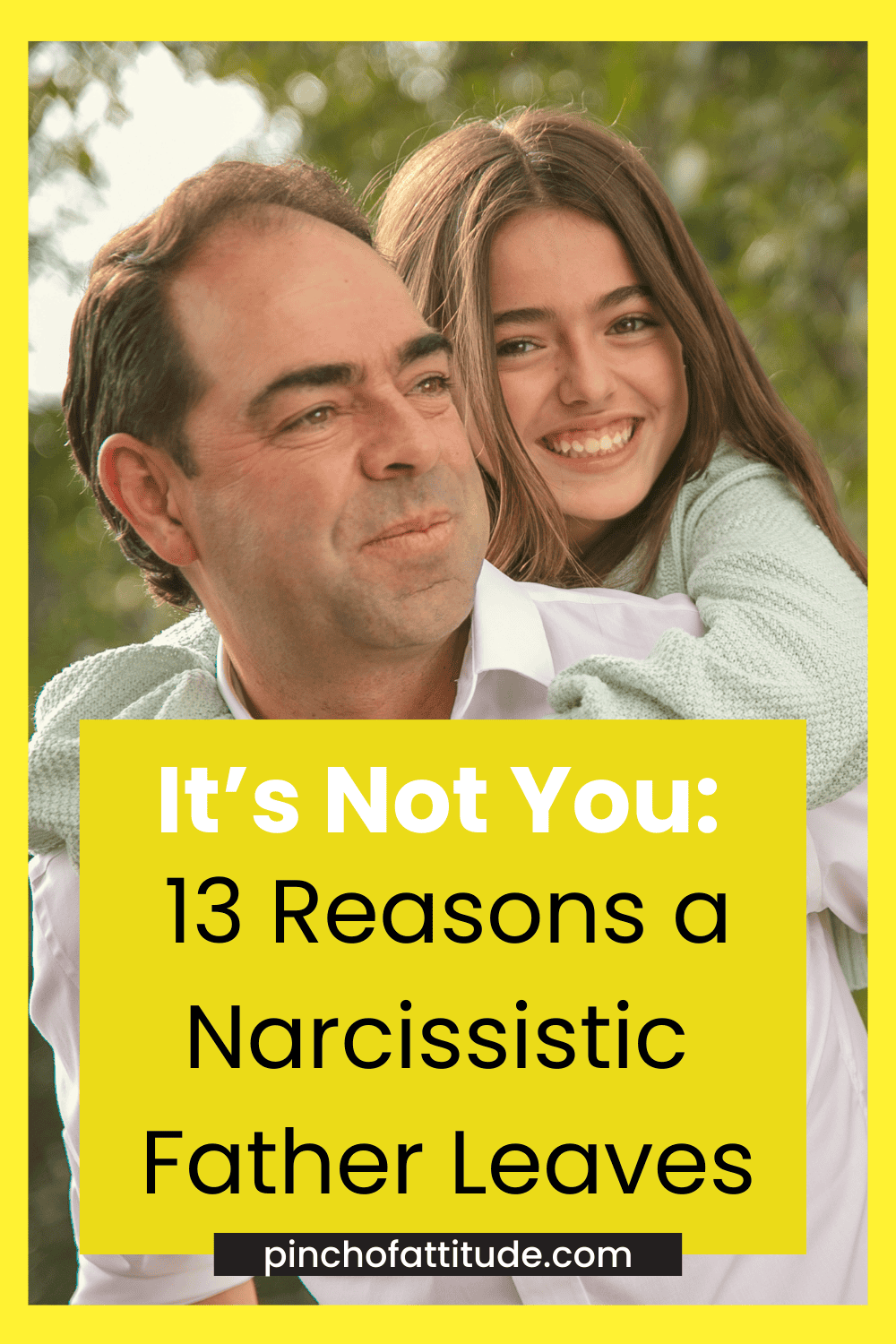As a child of a narcissist myself, I understand the pain of living in a world where one parent’s love feels more like a spotlight scorching your self-worth.
But my cousins faced a different heartbreak: their narcissistic father abandoning them to start a new family.
I’ve witnessed firsthand the deep scars it caused, which made me wonder even more why he did it to such bright, beautiful souls.
If you’re wondering about the same thing, I’ve got you. Below, I’ll talk about the 13 possible reasons a narcissistic father abandons his daughter.
This is not to point fingers or play the blame game. It’s to help you start healing from the trauma that your narcissistic parent left behind.
- Narcissist fathers prioritize self-fulfillment over emotional connection. Understand this to break free from blame and start healing.
- Prioritize healthy connections. Build a supportive network of loved ones who value you for who you are.
- A therapist can help you process the trauma, develop healthy coping mechanisms, and build resilience. Remember, you deserve love and happiness.
Table of Contents
13 Reasons Why a Narcissistic Father Abandons His Daughter

We all know the stereotype: the self-absorbed parent who prioritizes their own needs over everything else. But the reality is far more complex.
There are various aspects of their personality traits that may contribute to why narcissists abandon their families. Here are some of the reasons why:
1. Feeling Emotionally Disconnected From His Daughter
A narcissist may crave admiration, but true emotional connection? Not so much. Their lack of empathy makes genuinely connecting with their kids, or anyone, super tricky.
My cousins felt it in the forced smiles and the awkward silence whenever they interacted with their dad.
This emotional distance, I believe, was what made it easier for my uncle to walk away.
It’s a heartbreaking truth, but understanding it can help you move forward without blaming yourself.
2. Prioritizing His Need for External Admiration
Some narc dads view their children as their source of narcissistic supply, someone to stroke their ego and make them feel important.
When, as kids, my cousins couldn’t fulfill that role yet (or worse, when their cute, little chubby cheeks took the spotlight away from him), their father lost interest in them.
It’s messed up, I know, but seeing it through this lens helped them understand that their dad’s abandonment wasn’t about them, but his insatiable need for external validation.
3. Ignoring His Daughter’s Physical and Emotional Needs
It’s hard to imagine abandoning your child when they’re vulnerable and need you the most, but for a narcissist, self-preservation trumps all else.
My cousins learned early on that their physical and emotional well-being wasn’t their dad’s top priority.
This neglect, sometimes bordering on emotional abuse, chipped away at their sense of security and made them feel invisible and unimportant.
It’s no wonder, then, that their father saw no problem starting a new family, where he could rewrite the narrative and get the attention he craved.
Tip
A narcissistic father may leave you but know that it’s not a reflection of your worth. It’s a symptom of his inability to nurture genuine connection.
4. Fearing Emotional Vulnerability With His Daughter
My uncle could charm everyone with his carefully crafted persona. But behind the facade is a deep-seated sense of vulnerability, a fear of exposing his real self.
Forming a genuine connection with his children, especially one built on trust and emotional intimacy, was simply too risky.
He couldn’t handle the possibility of them seeing through his carefully constructed image, of witnessing his flaws and imperfections.
So, instead of nurturing their bond, he left. He opted for a fresh start, a clean slate where he wouldn’t risk exposing his true (potentially flawed) self.
5. Projecting His Insecurities Onto His Daughter
Ah, narcissistic projection. Like many with this kind of narcissistic behavior, my uncle was the best at deflecting blame and dodging accountability.
He used his children as the scapegoat, blaming them for his mistakes and shortcomings.
In his distorted reality, my cousins were “problem children.” They were labeled difficult, needy, or even unlovable, all to protect his fragile ego.
This constant negativity took a toll on their self-esteem, leading to feelings of confusion, shame, and even worthlessness.
I think this is one of the biggest contributors to his decision to leave. After all, it’s easier to abandon someone you see as a burden than to confront your flaws.
6. Seeking to Maintain Control and Dominance Over Family Dynamics
My cousins’ story took a bizarre turn when their dad reappeared years later after they’d built independent lives and careers.
Suddenly, the man who vanished when they were kids craved their attention again. But it wasn’t genuine connection he sought – it was control.
He saw their success as an extension of himself. He tried to insert himself into their lives and make them feel obligated to fulfill his needs.
This power play was a stark reminder of the emotional tightrope they walked as kids. Good thing, my cousins knew not to fall for his acts, thanks to their awesome mom.
Their decision to distance themselves wasn’t about rejecting their father, but about protecting their independence and refusing to be pawns in his game of control.
7. Dealing With His Unresolved Childhood Issues
Narcissistic parents often struggle with unresolved issues that can bleed into their parenting. And my uncle might be a case in point.
While we can’t diagnose him from afar, his behavior suggests a deep-seated pain that manifests as narcissism.
Maybe he craved the validation he never received, or perhaps his childhood was marked by neglect or abuse.
Whatever the reason, these unresolved issues might have fueled his need to control, his inability to connect emotionally, and ultimately, his decision to abandon his family.
8. Viewing His Daughter as a Competitive Threat

Children of narcissistic parents often face a strange dynamic: they can be adored one moment and then criticized the next.
My cousins, despite their successes, weren’t immune to this.
Their achievements, instead of sparking pride, made their dad feel threatened. He saw their independence and happiness as a challenge to his own dominance.
This sets the stage for a twisted dynamic where their accomplishments are either ignored or downplayed.
It’s painful to realize, but their dad’s abandonment might have stemmed less from a lack of love and more from a fear of being outshone.
9. Avoiding the Responsibilities of Fatherhood
Raising kids takes work, effort, and, sacrifice, which aren’t exactly a narcissist’s favorite activities.
Diaper changes? Emotional support? Forget it. These self-centered parents saw fatherhood as a burden, a chore that interfered with his pursuit of personal glory.
If you ask me, I’d say it’s narcissistic abuse disguised as indifference, which can leave children of narcissists feeling abandoned and unimportant.
Tip
You deserve a love that nurtures, not neglects. If not with your father, you can find that in the supportive relationships you choose to build.
10. Chasing Personal Ambitions and Power at the Expense of Family Time
For some parents, the pursuit of admiration and power often becomes their lifeblood, a common theme in the lives of children who’ve been abandoned by their narcissistic fathers.
Imagine a dad who prioritizes work promotions over soccer games, networking events over bedtime stories, and self-aggrandizement over genuine connection.
These children are left feeling like afterthoughts, their emotional needs sacrificed on the altar of the father’s ambition.
But know this: he didn’t leave because you weren’t good enough. He left because he was lost in his self-made maze.
11. Shunning Intimate and Close Relationships, Including With His Daughter
Deep conversations, shared vulnerabilities, even basic emotional support – these are all foreign concepts to a narcissist.
They prefer surface-level interactions and transactional exchanges that serve their needs without venturing into the messy territory of genuine connection.
This emotional distance often happens with narcissistic parents.
Perhaps the vulnerability required for genuine connection feels too risky, and they fear exposing their flaws or insecurities.
Whatever the reason, my uncle’s withdrawal left my cousins feeling emotionally abandoned, yearning for a closeness that never materialized.
12. Having a Distorted Understanding of Love and Affection
Narcissists have a unique understanding of love. They look at it as less “unconditional support” and more “praise buffet.”
Affection is doled out like sprinkles on a cupcake – only available if you live up to their often-shifting expectations.
I think this is one of the strongest reasons my uncle left his family. It might have stemmed from unmet expectations.
Maybe he craved a daughter who mirrored his grandiosity, and when their individuality shone through, he couldn’t handle it.
It’s important to understand that that is a reflection of his distorted view of love, not your inability to fulfill some impossible fantasy.
13. Escaping From the Perceived Burdens and Obligations of Being a Father
For someone who views the world as a personal playground, the sacrifices of fatherhood might have seemed like a prison sentence.
My uncle, for instance, probably saw his spouse and children as burdens, obligations that clashed with his pursuit of self-fulfillment.
This escape from responsibility left my cousin feeling unimportant, like an inconvenience he couldn’t be bothered with.
But it’s not too late. You can experience a love that offers security and commitment, and you can find that in the relationships you choose to build.
Tip
Let go of his baggage and build relationships on your terms. You deserve the kind of love that prioritizes you.
How Can Daughters Handle Their Narcissist Fathers’ Abandonment?
To start healing, daughters of narcissistic fathers need to understand that their dad’s actions weren’t about them.
If not addressed, this trauma can cause serious psychological and emotional damage that will affect their relationships in adulthood.
Here’s what my cousins did to break free from this toxic dynamic:
- Seek professional therapy or counseling: A narcissist’s children may have developed unhealthy coping strategies to deal with their pain. Seek therapy to unpack these patterns, understand their emotional impact, and develop healthier ways to move forward.
- Build a support network of friends, family, or support groups: Let go of the narcissist in your life so you can start building your support system. Friends, family, or even support groups can offer empathy, understanding, and validation.
- Create a plan to focus on mental and physical well-being: Prioritize activities that nourish your mental and physical well-being. Whether it’s mindfulness practices, exercise, or engaging in hobbies you enjoy, create a personalized plan to nurture your self-compassion and inner strength.
- Set boundaries for future interactions: Sometimes interactions with a narcissistic parent are unavoidable. Make sure you establish boundaries to protect yourself from gaslighting and other manipulative tactics.
- Focus on personal growth and development: Explore interests, cultivate talents, and pursue paths that bring you joy and fulfillment. Remember, what matters most is what you think you need, not anyone else’s expectations.
- Engage in activities that boost self-esteem and confidence: Do things that celebrate your strengths and talents, whether it’s mastering a new skill, volunteering for a cause you care about, or simply spending time with people who appreciate you for who you are.
- Understand and accept that you are not to blame for the abandonment: Release the burden of “what ifs” and understand that his limitations, not your flaws, led to this break. Forgive yourself for any emotional baggage it leaves behind.
- Explore and process emotions through journaling or creative outlets: These daughters experience a complex mix of emotions following the abandonment, stemming from years of emotional neglect. Journaling and creative expression through art, music, or writing can provide a safe space to explore and process these feelings, gain clarity, and release their hold on your present self.
- Learn about narcissism: Understanding the complexities of narcissistic personality disorder can bring valuable insight into your father’s behavior and its impact on your upbringing. By educating yourself about its core traits, you can move from feeling personally targeted to recognizing his limitations as a symptom of a larger condition.
- Consider mediation or guided communication if contact is necessary: This approach provides opportunities for respectful dialogue, minimizes the risk of manipulation, and ensures your emotional well-being is prioritized throughout the process.
Tip
His absence doesn’t define you. Reclaim your power by prioritizing self-care, building supportive connections, and understanding your worth.
Related Posts:
- Narcissistic Father and Daughter: Signs, Traits and How to Cope
- What Happens to Daughters of Narcissistic Fathers? You Are Not Alone
- How to Deal With a Narcissistic Father as a Daughter & How I Won Over the Trauma
- Surviving Abandonment: Four Things That Helped Me
- 10 Signs Abandonment Trauma Is Sabotaging Your Relationships
Frequently Asked Questions
Can a narcissistic father return after abandoning his daughter?
Yes, a narcissistic father may return, driven by shifting needs or circumstances. However, his return may not guarantee positive change or a healthy relationship.
Why would a narcissistic father discard his young children?
A narcissistic father may discard young children if their presence is perceived as hindering his pursuit of self-gratification and admiration.
Why do narcissists disappear even if they have children?
Narcissists disappear if children fail to meet their needs for admiration and validation. Their “love” is conditional, so they prioritize self-gratification over familial bonds.
Do daughters of narcissistic fathers carry a fear of abandonment into future relationships?
Daughters of narcissistic fathers often develop a deep-seated fear of being alone, leading to trust issues in future relationships.
Can daughters of narcissistic fathers break the cycle of abandonment in their own parenting?
Yes, daughters of narcissistic fathers can break the cycle of abuse. Recognize the red flags and actively work to foster healthy, supportive parenting.




